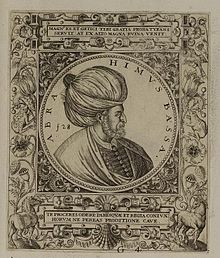Pargalı İbrahim Pasha
|
Pargalı · Frenk · · Maktul · Ibrahim Pasha |
|
|---|---|

Engraving of Ibrahim Pasha
|
|
| Grand Vizier of the Ottoman Empire | |
|
In office 27 June 1523 – 14 March 1536 |
|
| Monarch | Suleiman I |
| Preceded by | Piri Mehmed Pasha |
| Succeeded by | Ayas Mehmed Pasha |
| Ottoman Governor of Egypt | |
|
In office 1525–1525 |
|
| Monarch | Suleiman I |
| Preceded by | Güzelce Kasım Pasha |
| Succeeded by | Güzelce Kasım Pasha |
| Personal details | |
| Born | c. 1495 Parga, Republic of Venice |
| Died | 15 March 1536 Constantinople, Ottoman Empire |
| Nationality | Ottoman |
| Spouse(s) | Muhsine Hatun |
| Religion | Islam, previously Orthodox Christianity |
Pargalı Ibrahim Pasha ("Ibrahim Pasha of Parga"; c. 1495 – 15 March 1536), also known as Frenk Ibrahim Pasha ("the Westerner"), Makbul Ibrahim Pasha ("the Favorite"), which later changed to Maktul Ibrahim Pasha ("the Executed") after his execution in the Topkapı Palace, was the first Grand Vizier of the Ottoman Empire appointed by Sultan Suleiman the Magnificent.
Ibrahim, born a Christian, was enslaved during his youth. He and Suleiman became close friends in their youth. In 1523, Suleiman appointed Ibrahim as Grand Vizier to replace Piri Mehmed Pasha, who had been appointed in 1518 by Suleiman's father, the preceding sultan Selim I. Ibrahim remained in office for the next 13 years. He attained a level of authority and influence rivaled by only a handful of other grand viziers of the Empire, but in 1536, he was executed on Suleiman's orders and his property was confiscated by the state.
Ibrahim was born to Orthodox Christian parents in Parga, Epirus, then part of the Republic of Venice. His ethnicity is unknown, but he probably originally spoke a Slavic dialect and also knew Greek and Albanian. His father was either a sailor or a fisherman. Some time between 1499 and 1502 he was captured in a raid by Iskender Pasha, the Ottoman governor of Bosnia. He first met Prince Suleiman while residing at Iskender Pasha's estate near Edirne, most likely in 1514. It was then that he was taken into Suleiman's service.
Upon Suleiman's accession to the Ottoman throne in 1520, he was awarded various posts, the first being the Falconer of the Sultan. Ibrahim proved his skills in numerous diplomatic encounters and military campaigns, and was so rapidly promoted that at one point he begged Suleiman not to promote him too rapidly, for fear of arousing the jealousy and enmity of the other viziers, who expected some of those titles for themselves. Pleased with Ibrahim's display of modesty, Suleiman purportedly swore that he would never be put to death during his reign. After being appointed grand vizier, Ibrahim Pasha continued to receive other additional appointments and titles from the sultan (such as the title of Serasker), and his power in the Ottoman Empire became almost as absolute as his master's.
...
Wikipedia
